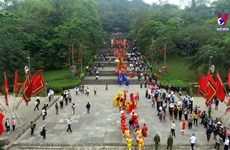Australian broadcaster lauds Vietnam’s efforts in beating COVID-19 again
The Australian Broadcasting Corporation (ABC) on September 23 ran an article, saying Vietnam has gone more than two weeks without a single case of coronavirus via community transmission, effectively beating the virus for a second time.
 Illustrative image (Photo: VNA)
Illustrative image (Photo: VNA)Sydney (VNA) – The Australian Broadcasting Corporation (ABC) on September 23 ran an article, saying Vietnam has gone more than two weeks without a single case of coronavirus via community transmission, effectively beating the virus for a second time.
The article said from the beginning of the pandemic, the Vietnamese Government went in fast and hard against the virus.
"From an early stage, communications about the virus and the strategy were transparent,” it cited the International Monetary Fund (IMF) as saying.
Guy Thwaites, Director of the Ho Chi Minh City-based Oxford University Clinical Research Unit, told the ABC that "Vietnam is very used to infectious diseases … it's had many outbreaks of infectious diseases over the past 20 years."
"This hasn't been a high-tech response, it's been a very rapid and very well organised response."
According to Thwaites, Vietnamese authorities did all of the simple stuff they did last time, but they did it at scale and they did it rapidly. Pool sampling was used, whereby the samples of five or six people can be tested together. If there is a positive result, all samples will be individually tested.
"Whole households went into one sample," the professor said, adding that communities or neighbourhoods with known cases were targeted first.
"In that way they were able to test the equivalent of around 100,000 people through around 20,000 tests. This allowed them to save a lot of time and money."
Jos Aguiar, an Australian working for a Vietnamese property company in Da Nang, told the ABC that the lockdown was a lot stricter than last time and the response on our street was good, they found a case and quickly locked it down.”
"In our neighbourhood they barricaded both sides of the street, it's an inconvenience but I am happy with the way Vietnam handled it."
Tran Ba Linh of Bath University and Robyn Klingler-Vidra of King's College London have been researching how the Vietnamese community has responded to the pandemic.
They told the ABC that Da Nang locals had "donated money, food and essential goods to the city's largest hospital, which was the epicentre of this second wave.”
"Upon discharge, [one patient] even founded a charity with his friends to produce disinfectant and sanitising booths for hospitals in and around Da Nang," they said.
The Vietnamese Prime Minister announced last week that flights between Vietnam and Seoul, Guangzhou, Taipei and Tokyo would resume, according to the article.
Tourists cannot enter yet, with repatriating Vietnamese and foreigners who are highly-skilled workers or investors given early priority.
Nevertheless, the economic fallout of COVID-19 will not be as punishing for Vietnam as for regional neighbours.
"Vietnam is still being expected to be one of the few countries that will continue to grow in 2020, while the rest of the world is being projected to enter into recession," the ABC cited the international consultancy firm PricewaterhouseCoopers as saying.
The Asian Development Bank (ADB) projects Vietnam's economy will grow by 1.8 percent this year, making it one of the only few Southeast Asian economies not to contract.
Nevertheless, Tran and Klingler-Vidra said "most of the people took care of themselves, so there has been little sense of being forced to do anything".
"Masks, social distancing, quarantine, lockdown were not politicised; they were simply tools and measures to keep you and loved ones safe," they were quoted by the article as saying./.













